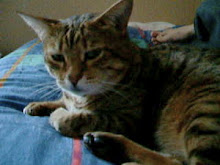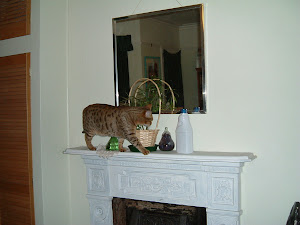英公共放送の医学特派員ファーガス・ウォルシュ記者による3月23日付け記事です:
http://www.bbc.co.uk/blogs/thereporters/ferguswalsh/
マンチェスター大学客員教授でドルトン原子力研究所のリチャード・ウェイクフォード教授は、東京の水道を飲むことによる健康への影響は極めて小さい、と言います。
Professor Richard Wakeford from the Dalton Nuclear Institute and visiting Professor of Epidemiology at Manchester University said the health effects would be extremely small.
同教授の計算によると、現在日本政府が制定している限度レベルの放射能を含む水道を1年間飲み続けることは、例えば乳幼児に対しては0.4ミリスィーヴァートを摂取させる程度ということとなり、これを倍増でもしなければ、高いレベルの放射能を1年間も摂取し続けたという効果は得られないのです。
He calculated that drinking water for a year at the Japanese limit would give an infant a dose of 0.4 millisieverts (mSv), so you would need to double that to get the effect of drinking water at the higher level of radiation for a year.
すなわち、「理論上、発ガンのリスクは非常に低く、通常、地球上の誰もが自然に被爆するレベル以上の放射能を浴びることとなるとは言いがたい程の極端な低いレベルなのです」と言います。
Professor Wakeford said "in theory, there would be a very small additional risk of cancer, but in practice nothing more than you could expect to get from normal background levels of radiation".
それゆえ、1年間東京の水道水を飲むリスクは、例えばロンドンからコーンウォール地方に1年間移住する人のリスクよりも低いと言えます。(訳注:英国内の平均より、同地方では2倍強の自然被曝が観察されるというデータに基づく判断です。)
So the extra risk from drinking tap water in Tokyo for a year would be far less than that of someone moving, say, from London to Cornwall for a year.
科学者数名が既に指摘している通り、東京の水道水に関する警告は、単に「用心のため」の慎重で理にかなった対策に過ぎず、もし避けることが可能なリスクであれば、避けるにこしたことは無いという原則に基づくものに過ぎません。
As several scientists have pointed out, the alert about drinking water in Tokyo is simply a sensible precautionary measure, based on the principle that if you can easily avoid risk, you should do so.
ポーツマス大学の環境物理学部ジム・スミス博士は、「長期的に安全を確証するために、故意に低いレベルに設定してあるという事実を強調しなければなりません」と言います。
Dr Jim Smith, Reader in Environmental Physics at the University of Portsmouth said: "It should be emphasised that the limit is set at a low level to ensure that consumption at that level is safe over a fairly long period of time.
「すなわち、たとえば数リットルといった少量の水道水を飲む場合に、勧告される限界レベルの倍を摂取したとしても、健康に対するリスクは非常に低いということです」。
This means that consumption of small amounts of tap water - a few litres, say - at twice the recommended limit would not present a significant health risk.
「水道水を避けるようにという勧告は、妊娠中の婦人や、授乳中のお母さんをも対象として含まれることになると予測しています」。
I would expect that the recommendation not to drink tap water would also extend to women who are pregnant or breastfeeding."
しかしながら、「東京の水道水警告が、日本の食料・飲料水供給をめぐって不安・恐怖感のパニックを巻き起こしている」という報道を目にします。
Nonetheless, one bit of newswire copy said that the tap water alert in Tokyo was sending "anxiety levels soaring over the nation's food and water supply".
東京都民は、スーパーのボトル水の棚を空にしてしまうほど買い占めしている、と報じられています。
Residents in Tokyo are reportedly clearing the supermarket shelves of tap water.
日曜日に、福島原発の近隣区域からの牛乳やホウレンソウをはじめとする野菜類が基準レベルを超えていることが判明しましたが、日本当局は、健康に直接リスクを及ぼさないと発表してはいたのですが。
On Sunday, milk, spinach and other vegetables from areas near the Fukushima plant were found to have radiation levels higher than regulated standards, but the Japanese authorities said it did not pose an immediate risk to health.
福島第一からの放射能漏れ問題を軽視するつもりは全くありません。
I do not mean to underplay the issue of the Fukushima nuclear leak.
しかし、東京水道水の危険は、約9千5百名の死者と1万4千7百名の行方不明者を出した地震と津波に比べれば、屁でもないのです。
But the dangers from Tokyo tapwater do not bear any comparison with the earthquake and tsunami where there are currently nearly 9,500 confirmed dead and more than 14,700 people still missing.
(以上 一部転載)
日本語訳に意訳し過ぎなど(「屁」という言葉を使うな!自分)多少問題がありますが、誤訳はありません(きっぱり)。
ファーガスは、医学博士のプレス発表を専門に報道している記者です。理系です。首都圏のボトル水買い占め騒ぎは必要ないと明言しているのです。
都民の買い占めショッピングはやめるように、皆様、上記の情報の拡散を願います。
2011年3月28日
2011年3月18日
Japan update - Hachinohe Port , Aomori Prefecture photos八戸特派員報告


Our Hachino-he Correspondent Appletree-san has sent us the above two images shot in 11th March 2011.
青森県八戸市の昨夜の状態です。(港)
The Tsunami has flipped around the cars.
津波で車が打ち上げられています。
Many ships were washed away from the port in frightening, stormy waves.
船がすごい勢いで何艘も沖に流されていきました。
Houses? Sheds? They were all washed away. It was too dark to shoot.
家? 小屋? みたいなものも流されていましたが、暗くて撮影できず。
Can you see the waves? Regrettably the resolution is not high due to lack of light.
波が見えますか?暗いので不鮮明ですが。
Because of the power cut, we don't have access to the net and cannot reply any communication.
電気通じておらず、ネットにもつながらないので返信不可です。
However, local people here are relatively calm because we experience quakes considerably frequently.
地震が多いところなので、皆割合冷静沈着。
It's just we cannot recharge our mobile phones.
ただ、携帯の充電ができません。
As our fridge is dead, we must consume food from our freezer.
食料は冷蔵庫が使えないので冷凍庫のものを食べなくてはならない。
Suppose it won't be rotten as it is too cold.
寒すぎて悪くはならないでしょう。
It could have been worse.
不幸中の幸い。
From Hachinohe, Aomori Prefecture.
以上 八戸の情報でした。
寒すぎて悪くはならないでしょう。
It could have been worse.
不幸中の幸い。
From Hachinohe, Aomori Prefecture.
以上 八戸の情報でした。
アップルツリーさま、大変な困難を経験されておられることと存じますが、粘ってください、赤十字募金活動など出来る限りの支援を開始しておりますから!
Please hang on there, we are doing all we can to support you by donating to the British Red Cross and campaigning for Japan!
2011年3月16日
Please do not panic. パニックしないでください
The British Ambassador and is staff are in Sendai City to help UK citizens there.
http://ukinjapan.fco.gov.uk/en/news/?view=News&id=566454282
駐日英国大使と英外務省スタッフは、仙台入りして在日英国人の安否確認に尽力しています。
Professor Richard Wakeford, an expert in radiation exposure at the University of Manchester, is quite confident that the majority of Japanese people would not suffer severe health problems because of the Fukushima Daiichi nuclear power plant.
http://www.bbc.co.uk/news/health-12722435
マンチェスター大学リチャード・ウェイクフォード教授は、専門家として、福島第一の事故によってチェルノブイリ並みの被害がでることはまずないと英公共放送BBCの取材に応じて語りました。
Professor Gerry Thomas, who has studied the aftermath of the Chernobyl disaster, said: "It is very unlikely that this will turn into anything that resembles Chernobyl.
http://www.bbc.co.uk/news/health-12722435
チェルノブイリ原発事故後の被爆状況調査を実施したジェリー・トマス教授も、福島がチェルノブイリの二の舞になることは先ず無いと名言しています。
Donate to Red Cross, it may be tax deductible.
赤十字募金口座に送金した場合、納税者は控除対象となる可能性もあります。
Let victims secure necessary water, food, batteries, etc while they suffer water/power shortage.
被災者の方が必要な水、食料、乾電池など、優先して供給してあげてください(パニック買い占めは自粛願います)。
http://ukinjapan.fco.gov.uk/en/news/?view=News&id=566454282
駐日英国大使と英外務省スタッフは、仙台入りして在日英国人の安否確認に尽力しています。
Professor Richard Wakeford, an expert in radiation exposure at the University of Manchester, is quite confident that the majority of Japanese people would not suffer severe health problems because of the Fukushima Daiichi nuclear power plant.
http://www.bbc.co.uk/news/health-12722435
マンチェスター大学リチャード・ウェイクフォード教授は、専門家として、福島第一の事故によってチェルノブイリ並みの被害がでることはまずないと英公共放送BBCの取材に応じて語りました。
Professor Gerry Thomas, who has studied the aftermath of the Chernobyl disaster, said: "It is very unlikely that this will turn into anything that resembles Chernobyl.
http://www.bbc.co.uk/news/health-12722435
チェルノブイリ原発事故後の被爆状況調査を実施したジェリー・トマス教授も、福島がチェルノブイリの二の舞になることは先ず無いと名言しています。
Donate to Red Cross, it may be tax deductible.
赤十字募金口座に送金した場合、納税者は控除対象となる可能性もあります。
Let victims secure necessary water, food, batteries, etc while they suffer water/power shortage.
被災者の方が必要な水、食料、乾電池など、優先して供給してあげてください(パニック買い占めは自粛願います)。
登録:
投稿 (Atom)



